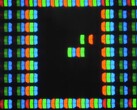Researchers have developed a clever new method for storing digital data in DNA without the hassle of synthesizing custom DNA sequences from scratch. A recent Nature paper explains how they hijacked a natural epigenetic process called methylation to basically "print" information onto existing DNA strands.
Usually, DNA data storage involves converting digital data into sequences of A, C, T, and G nucleotide bases. Then, through a process called de novo synthesis, these sequences are chemically created in the lab to form the data-packed DNA. Despite significant strides in this area, it's still a slow, pricey, and error-prone process—not exactly ideal for large-scale data archiving.
However, the team from Peking University and other institutions sidestepped these issues by using methylation to rewrite naturally occurring DNA. Methylation is an epigenetic modification that organisms typically use to switch genes on or off without changing the actual genetic code.
They developed 700 unique DNA "movable type" fragments as building blocks for their storage system. By selectively assembling specific movable types onto a master DNA template, they encoded digital data. An enzyme then adds methyl groups at certain spots, chemically tagging the DNA with the desired sequence of 1s and 0s.
In their experiments, they managed to store and retrieve high-res images of a panda and an ancient Chinese drawing with up to 97.47 percent accuracy. The researchers hit a data writing rate of nearly 350 bits per DNA synthesis reaction, faster than de novo synthesis. The methylation-based method is theoretically much cheaper since it reuses existing DNA templates instead of needing new ones from scratch.
Sure, it's still not as speedy or cost-effective as electronic storage. Still, this epigenetic spin on DNA data storage is a big leap toward handling the massive growth of digital data using nature's own storage medium. With further tweaks, DNA storage systems using methylation could become a practical way to archive the world's data in a low-power, durable, and more affordable format than building DNA from the ground up.
The researchers said, "With DNA data storage entering the dawn of commercialization, the epi-bit framework demonstrates potential directions in parallel molecular information storage with prefabricated modularity."
Source(s)
Nature (in English)


















